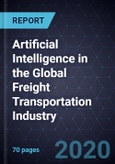AI Plays an Important Role in Creating an Intelligent Operational Network, Enabling Transformational Growth Strategies in the Global Freight Transportation Industry
This study analyses the key trends and applications of artificial intelligence in the freight transportation industry by mode of transport i.e. road, rail, air, and ocean freight transportation. This research also analyses the disruptive impact of artificial intelligence on freight transportation business operations and discusses its adoption prospects until 2025. With increased trade flow, the fleet population in freight transportation has become denser, and expectations of customers have evolved beyond recognition, resulting in complex transport operations, requiring operational flexibility from freight operators. Human errors in operations, underutilized assets, low workforce productivity, inefficient operational planning, inability to match supply with demand, and trimmed profit margins are key prevailing concerns with freight operators.
The emergence of digital technologies and the rapid technological advancements in digitization have transformed the business and operational landscape of the global freight transportation industry. It is essential for freight operators to embrace such operational complexity and evolve by adopting technologies to turn complexity into an advantage.
Today, the world is connected more than ever, and the growth of data generation has been exponential with smart devices and process automation. Data-driven insights help freight operators move forward and gain a competitive advantage over their peers. Artificial intelligence enables freight operators to harness data more effectively for actionable insights. Artificial intelligence-powered systems in conjunction with other digital technologies such as internet of things and big data analytics utilize data to its full potential to anticipate events for freight operators, aiding them to avoid risks and create innovative solutions. Machine learning algorithms based on neural networks powered by artificial intelligence would unlock multiple benefits for companies operating in the freight transportation industry.
AI brings changes to the supply chain with autonomous vehicles, helping fleet operators reduce operating cost with and fuel consumption and plan optimized routes for service. The freight operators that are enhancing their capabilities with artificial intelligence are reaping its benefits by increasing efficiency with predictive intelligence. Artificial intelligence also enriches the relationship between the shipper and carrier with personalized service offerings.
Advanced sensor fusion with artificial intelligence supports the integration of smart infrastructure and operating assets and the freight operators in the development of connected freight ecosystem, aiding autonomous fleet management. The transformation of the logistics industry due to artificial intelligence is imperative in the near future; however, the readiness and openness of freight operators for an AI-based data-driven environment will determine how well this industry copes with challenges.
Table of Contents
Companies Mentioned (Partial List)
A selection of companies mentioned in this report includes, but is not limited to:
- Cargofy
- FERO
- KONUX








